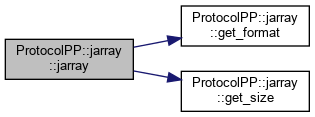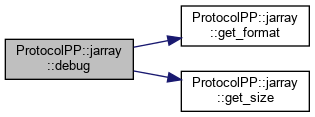Constructor & Destructor Documentation
◆ jarray() [1/9]
Constructor for jarray initialized to size
- Parameters
-
size - size to initialize the array to
◆ jarray() [2/9]
Constructor for jarray initialized to size with value
- Parameters
-
init - initializer list in curly braces myarr<uint8_t> {0x10, 0x1E};
◆ jarray() [3/9]
Constructor for jarray initialized to size with value
- Parameters
-
size - size to initialize the array to value - value to initialize the array to format - endianness of the constructed array (BIG, LITTLE)
◆ jarray() [4/9]
Copy Constructor for jarray
- Parameters
-
rhs - array to copy format - endianness of the constructed array (BIG, LITTLE)
◆ jarray() [5/9]
Constructor for jarray from a string
- Parameters
-
rhs - string to populate the array with format - endianness of the constructed array (BIG, LITTLE) encoded - Input string has already been encoded as HEX characters instead of being a simple string. For example, if the input string had been encoded as bytes each character in the string would be equal to something like '0x6C' or '0xAE'. If the input was a simple string each character would represent a single value such that the string "123ABC" is really "1", "2" "3", "A", "B", "C" and needs to be converted and grouped into HEX such that the resulting array has "0x12", "0x3A", and "0xBC". The Crypto++ library uses encoded strings. Set encoded to true to read in ASCII characters

◆ jarray() [6/9]
Constructor for jarray from a standard vector
- Parameters
-
rhs - vector to initialize the array with format - endianness of the constructed array (BIG, LITTLE)
◆ jarray() [7/9]
Constructor for jarray from a uint8_t raw pointer and size
- Parameters
-
rhs - byte pointer to initialize the array with size - length of the data to convert format - endianness of the constructed array (BIG, LITTLE)
◆ jarray() [8/9]
Constructor for jarray from a shared pointer
- Parameters
-
rhs - byte pointer to initialize the array with format - endianness of the constructed array (BIG, LITTLE)
◆ jarray() [9/9]
Constructor for jarray from one type to another
- Parameters
-
rhs - initial array to convert. Conversion is to type of array that is being constructed. Example: format - endianness of the constructed array (BIG, LITTLE)

Member Function Documentation
◆ append() [1/3]
Method to add the array rhs to the current array
- Parameters
-
rhs - array to add to this array

◆ append() [2/3]
Method to add the array rhs to the current array
- Parameters
-
rhs - initializer list to add to this array
◆ append() [3/3]
Method to add the array rhs to the current array
- Parameters
-
rhs - pointer to array to add to this array rhs_size - length of the array pointed to by rhs

◆ debug()
Method to compare arrays side by side for debug as shown below prints to std::err
- Parameters
-
expect - Expected data to print indent - default indentation for pretty printing
- Returns
- string representation of this array

◆ empty()
Method to determine if the array is empty
- Returns
- True/False if araay is empty
◆ erase()
Method to remove the elements from the array starting at index and continuing for size. The original array is reduced by the number of elements requested
- Parameters
-
index - location to start erasing elements elements - number of elements to remove from this array
◆ extract()
Method to extract the number of elements from the array starting at the start value
- Parameters
-
index - index to start the extraction elements - number of elements to split from the array
- Returns
- new array containing the split off values

◆ get_format()
Method to return endianness format of this array
- Returns
- endianness format for this array
◆ get_ptr() [1/2]
Method to return the pointer to the underlying data object of the array
- Returns
- pointer to the data object
◆ get_ptr() [2/2]
Method to return the pointer to the underlying data object of the array
- Returns
- pointer to the data object
◆ get_shared() [1/2]
Method to return the shared pointer of the array
- Returns
- shared pointer to the data object
◆ get_shared() [2/2]
Method to return the shared pointer of the array
- Returns
- shared pointer to the data object
◆ get_size()
Method to retrieve size of this array
- Returns
- Size of the array
◆ insert()
Method to insert the array rhs into this array starting at index The array is resized to accomodate this array plus the new array No elements of the original array are overwritten
- Parameters
-
index - location to start the insertion rhs - array to insert into this array

◆ intersect()
Method to intersect two arrays and return the shared valeus in both arrays
- Parameters
-
rhs - array to intersect with this array (retains shared values)

◆ operator!=() [1/2]
Method to compare two different arrays. First compares array size then iterates through all array values and compares them for inequality
- Parameters
-
rhs - array to compare with this array
- Returns
- true/false value for array comparison

◆ operator!=() [2/2]
Method to compare two different arrays. First compares array size then iterates through all array values and compares them for inequality
- Parameters
-
rhs - array to compare with this array
- Returns
- true/false value for array comparison

◆ operator&=()
Method to AND two different arrays
- Parameters
-
rhs - array to AND with this array

◆ operator*=()
Method to MULTIPLY two different arrays
- Parameters
-
rhs - array to MULTIPLY with this array

◆ operator+=()
Method to ADD two different arrays
- Parameters
-
rhs - array to ADD with this array

◆ operator==() [1/2]
Method to compare two different arrays. First compares array size then iterates through all array values and compares them for equality
- Parameters
-
rhs - array to compare with this array
- Returns
- true/false value for array comparison

◆ operator==() [2/2]
Method to compare two different arrays. First compares array size then iterates through all array values and compares them for equality
- Parameters
-
rhs - array to compare with this array
- Returns
- true/false value for array comparison

◆ operator[]() [1/2]
| T & jarray::operator[] | ( | uint32_t | index | ) |
Method to return array value at index
- Parameters
-
index - location of array element to return
- Returns
- array element at index
◆ operator[]() [2/2]
Method to return const array value at index
- Parameters
-
index - location of array element to return
- Returns
- const array element at index
◆ operator^=()
Method to XOR two different arrays
- Parameters
-
rhs - array to XOR with this array

◆ operator|=()
Method to OR two different arrays
- Parameters
-
rhs - array to OR with this array

◆ pop_back()
Method to removed the last element from the array. The element is destroyed in the process
◆ push_back()
Method to add a single element to the end of the array
- Parameters
-
rhs - element to add to this array
◆ resize()
Method to change the array size
- Parameters
-
newsize - either shrink or expand the array to the new size
◆ split()
Method to split the number of elements from the front of the array and return it to the caller. The original array is reduced by the number of elements split from it
- Parameters
-
elements - number of elements to split from the array
- Returns
- new array containing the split off values

◆ to_string()
Method to convert this array into a string representation for printing purposes. Output is formatted either as a single, long string of HEX characters if 'printable' is false or is a pretty printed 16-bytes across with underscores as follows if 'printable' is true
- Parameters
-
printable - if false, output is a single string of HEX characters. If true, enables pretty_printing of the array with formatting indent - default indentation for pretty printing ignored if printable is false xml - Print as an XML data object as found below * 22223333444455556666777788889999 * 2222333344445555666677778888 *
- Returns
- string representation of this array

◆ update()
Method to update the array rhs into this array starting at index The array is resized to accomodate this array plus the new array Elements of the original array starting at index and extending for the length of rhs are overwritten with the new values
- Parameters
-
index - location to start the update rhs - array to update this array with

The documentation for this class was generated from the following file:
- include/jarray.h